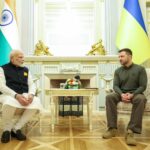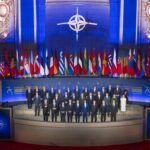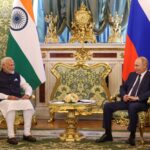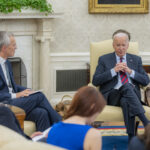Miffed that Russia refuses to cease fighting along the current front lines, which would facilitate a ceasefire of sorts as a starting point, President Donald Trump has imposed tough sanctions against Russia’s two largest oil companies, Rosneft and Lukoil, to ramp up pressure on Moscow to end the war against Ukraine that began as a “Special Military Operation” on February 24, 2022.
This is the first set of punitive measures against Russia imposed by the second Trump administration, in the hope that the economic squeeze on oil revenues will yield results. Europe has followed suit, aiming to cut off the economic and financial lifeline of President Vladimir Putin.
President Trump had backed the “current front-line freeze” proposal of Ukraine and Europe. “Let it be cut the way it is… cut and stop at the battle line. Go home. Stop fighting. Stop killing people,” Trump said at the start of the week, perhaps hoping that this could serve as a frame of reference for his planned meeting with President Putin in Budapest, Hungary. That meeting has now been put on the back burner amid apprehensions that there may not be a deal along the lines anticipated by Washington. The Kremlin has insisted that its view of a “long-term, sustainable peace” would not align with a “freeze” on current battle lines, which it sees as only temporary.
Moscow further maintains that the “root causes” of the conflict must be addressed, which include control over the Donbas region, large parts of which are already held by Russian forces. Additionally, Russia has demanded the demilitarization of Ukraine, a virtual non-starter. While vague phrases were floated for the now-cancelled summit between the presidents in Budapest, a planned meeting between the two foreign ministers—Sergey Lavrov and Marco Rubio—also did not materialize. Adding to the summit suspense are reports that President Putin’s advance security team may be searching for viable air routes, as his aircraft would have to avoid European Union airspace due to the active arrest warrant issued by the International Criminal Court.
It is difficult to see Kyiv and Europe agreeing to cede Donbas and other territories to President Putin, fearing that such concessions would only set the stage for further aggression. Hawks in Ukraine and Europe argue that failure to stand up to Moscow during the invasion and annexation of Crimea in 2014 led to the present situation. Even now, critics say that the Biden administration may have “slept at the switch” and failed to act effectively as President Putin prepared his invasion – despite clear warnings from the Central Intelligence Agency.
Putting aside history and notions of grandeur for another day, President Putin – through more than two decades in power – has been deeply concerned, if not obsessed, with the eastward expansion of the North Atlantic Treaty Organization (NATO). In 1962, President John F. Kennedy objected to the stationing of Soviet missiles in Cuba, which nearly brought Washington and Moscow to the brink of nuclear war. The argument then was that missiles in Cuba could not be tolerated in the “backyard” of the United States. By that logic, how could Washington or the capitals of Europe expect Putin to accept NATO encroaching on his “front yard,” with Ukraine pushing aggressively to join the alliance?
It is no secret that the Biden administration did not address President Putin’s top concern prior to the invasion: NATO membership for Kyiv, which was dismissed as a “non-issue.” It is said that, in the days leading up to the invasion, President Putin remarked, “We need to resolve this question now… [and] we hope very much our concern will be heard by our partners and taken seriously.”
The argument by some that NATO is a defensive alliance and not a threat to Russia has not been persuasive. Scholars like Anatol Lieven of the Quincy Institute had argued, prior to the invasion, that the United States should propose “a declaration of a moratorium on Ukrainian membership of NATO for a period of 20 years, allowing time for negotiations on a new security architecture for Europe as a whole, including Russia.”
Moscow has long maintained that Washington went back on the “word” given by Secretary of State James Baker to Soviet leader Mikhail Gorbachev on February 9, 1990, that if Germany were unified within NATO, the alliance’s jurisdiction would not move “one inch eastward.” Baker’s “word,” it is argued in some quarters, was never formalized through a treaty or may have been limited to East Germany alone.
It is also noted that the American Embassy in Bonn informed Washington in a cable about what West German Foreign Minister Hans-Dietrich Genscher said on January 31, 1990: “…that the changes in Eastern Europe and the German unification process must not lead to an ‘impairment of Soviet security interests.’” Some now argue that President Putin’s biggest grievance was not NATO’s “eastward move,” but rather the Kremlin’s exclusion from the process.
President Trump is also acutely aware of another sensitive issue that looms over any potential path to lasting peace in Ukraine: the stationing of foreign troops as a means of guaranteeing Kyiv’s security. Nearly thirty years ago, the “Father of Containment,” George Kennan, warned that the expansion of NATO would be the “most fateful error” of American policy in the post–Cold War era.
“Such a decision may be expected to inflame the nationalistic, anti-Western, and militaristic tendencies in Russian opinion; to have an adverse effect on the development of Russian democracy; to restore the atmosphere of the Cold War to East–West relations; and to impel Russian foreign policy in directions decidedly not to our liking.” Surely, Kennan was not taking a sentence out of President Putin’s playbook.
Disclaimer: The opinions and views expressed in this article/column are those of the author(s) and do not necessarily reflect the views or positions of South Asian Herald.






